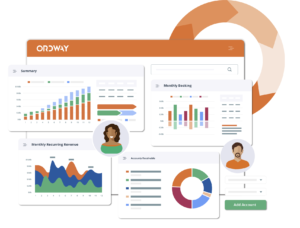With more than two decades of experience shaping enterprise software, Sameer Gulati has witnessed firsthand how finance teams struggle with rigid systems and outdated processes. From his early days at Intacct, Workday, and Zuora, to founding Ordway in 2018, Gulati has been driven by a single vision: to eliminate the inefficiencies behind billing and revenue operations through automation. Today, that vision is evolving with the rise of artificial intelligence. In this interview, Gulati shares how Ordway is redefining finance automation in the AI era. It is turning once-manual, error-prone workflows into intelligent, adaptive systems that empower finance teams to focus on strategy, not spreadsheets.
Sameer, you’ve spent more than two decades in enterprise software. Can you share a bit about your backstory and what led you to start Ordway?
My journey in software started over 25 years ago. I have a computer science background and began as a programmer. I became deeply interested early on in building software for the Office of the CFO and was first employees at a company called Intacct, which pioneered the shift from on-prem to cloud-based finance systems. Later, I joined Workday in its early days, helping roll out their AP/AR offerings. I also led product efforts at Zuora as the subscription economy took off.
Through these roles, I saw firsthand how inflexible most finance applications were. The gymnastics CFOs needed to jump through to close the books each month were evident. Billing is one of the most challenging areas because, unlike other financial applications, it is customer-facing. As a result, billing needs to bend in unusual ways to meet bespoke customer requirements. That inspired me to launch Ordway in 2018 with a simple but powerful goal. We aim to automate the complex, time-consuming work behind the invoice-to-pay process.
You say finance is often the last to adopt new technology. How is AI starting to change that?
AI is breaking down some of the barriers that traditionally made finance applications inflexible. An example is financial reporting. Every finance application has some level of reporting. Historically, a developer would write code that queries the underlying database to retrieve the information (e.g., number of new customers added this quarter). If the customer needed a different version of the report, they would have to pull the data into a spreadsheet and manipulate it. Some vendors offer the ability to configure the reports in the application. However, that typically requires financial analysts to become experts in the data models of the underlying software to set up the reports correctly. With AI, there is no need to understand these nuances. You can simply type in a natural language prompt asking the question you are hoping to answer, “how many customers will churn this month?” and the AI will bring back the answer.
AI is everywhere, but the term “AI-native” is often misunderstood. What does it really mean for a platform like Ordway?
These days, companies claim to be “AI-native” because they added a single API call to OpenAI. That’s not AI-native, that’s a feature. True AI-native software is re-architected from the ground up to learn from data, automate decision-making, and act on behalf of the user.
At Ordway, we’ve always centered on automation. We’re now taking that further by adding generative and predictive AI into reporting, workflow creation, and contract generation. We are adding more. Our goal is to move from 95% automation to 100%. We envision a system where it truly works for the user with minimal direction.
How does Ordway help finance teams actually apply AI in practical, everyday ways?
One of our early customers put it best, he said, “Ordway just works behind the scenes.” That’s what we strive for. Today, we’re using AI to power intelligent reporting (“Show me ARR by customer for the last 12 months”), workflow generation from natural language, and even AI-assisted data entry.
For example, instead of clicking through 20 screens to create a contract, a user can type “Build a 12-month contract for customer X using our starter plan,” and it’s done. These aren’t just time savers; they reduce human error and allow finance teams to focus on strategic work.
In a market flooded with billing and revenue tools, how does Ordway stand apart?
Ordway isn’t just another billing system, it’s an end-to-end revenue automation platform. We built it to handle the widest variety of pricing models, the widest variety of contract types. We’re API-first and modular, so companies can adopt what they need without ripping out their existing systems.
Where we really stand out is in our automation philosophy. We’re not just helping companies close their books faster. We’re helping them get closer to a true zero-day close. With AI, we’re doubling down on eliminating the friction that slows down finance teams.
What are some misconceptions companies have when they try to integrate AI into their systems?
There’s a lot of confusion. Many think plugging into OpenAI means you’re “doing AI.” But AI is not one-size-fits-all. The power lies in making it context-aware, understanding structured data, building intelligent workflows, and adapting based on user behavior.
Also, trust is still a huge factor. AI hallucinations are real. In finance, that’s unacceptable. We’re focused on building features that enhance trust, pre-checking tasks, surfacing smart suggestions, and making AI a second set of eyes instead of a black box.
Some say AI will reduce jobs. Others say it will unlock productivity. Where do you stand?
It’s productivity, hands down. We’re not laying off people; we’re trying to triple productivity. Just like factories got automated decades ago and people found new, more skilled roles, the same is happening now. AI will raise the bar, not lower the need for people. The expectation will simply be that every person delivers more.
What is your long-term vision for how AI will reshape enterprise software?
Think Iron Man — Robert Downey Jr. talking to Jarvis (his AI assistant) that actually gets things done. That’s where we’re headed. AI agents will be managing workflows, other agents, and even full teams of tasks. The shift won’t just be about individual tools. It’s about an entirely new way of working.
In business software, this means less clicking, less data entry, less guesswork. The system will know what you need before you ask, and act on it with confidence. That’s the future and we’re building toward it now.
Finally, what do you want the industry to associate with the Ordway brand as you grow?
One word: flexibility. That’s been our mission from day one. Technology-centric growth companies continue to develop more innovative pricing models and contract structures. A few years ago, the dominant model with subscription pricing was where customers paid a fixed fee per month for each user, and everyone paid in advance. We’ve seen a dramatic shift towards usage-based pricing over the past few years. High-growth companies now are selling tokens and credits. This results in variable fees each month, and invoicing in arrears. Three years from now, it will be something different
Finance teams need flexible billing platforms that allow them to future-proof their pricing strategies. With a flexible platform like Ordway, finance teams can quickly pivot to newer models and help the sales team win more deals.
As finance leaders continue to navigate an era of rapid change, Gulati’s vision for Ordway highlights how true AI-native platforms can transform back-office operations into engines of growth. By automating the most complex aspects of billing and revenue management, Ordway is paving the way for finance teams to achieve unprecedented flexibility, speed, and accuracy. For Gulati, the future of enterprise software is clear: systems that think ahead, adapt seamlessly, and free people to focus on higher-value work.



































